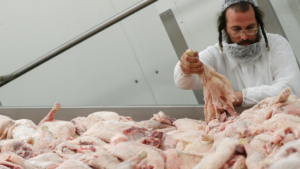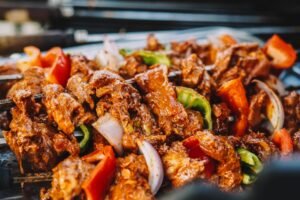According to the research, the amount of industrial livestock slaughtered each year is comparable to eight times the world’s human population. Never in history have there been as many animal deaths or life-long hardships. The fundamental factor behind animal mistreatment and misery is factory farming. They have been transformed into machines that produce meat, milk, and eggs from these mute victims. We take away the lives of these sentient animals, who have a wish to live.99% of the animals in the world today that are raised for food are kept in filthy, windowless sheds on enormous industrial “factory farms,” where thousands of them are crowded into wire cages, metal crates, or other severely constrictive arrangements. These creatures will never breed, care for their young, dig in the ground, make nests, or do any other essential and natural tasks. Until the day they are put into trucks and driven to slaughterhouses, the majority of them won’t even experience the sun’s warmth on their backs or the feeling of fresh air. Those born with the greatest vulnerability frequently die without access to veterinary care. They frequently end up in the garbage because of their brief, nameless life. They never get to encounter even the smallest act of kindness.
The industry of factory farming seeks to increase output while decreasing costs—always at the expense of the animals. Even if many of the animals perish from sickness or infection, the enormous businesses that manage the majority of factory farms have discovered that they can earn more money by packing as many animals into as small of places as they can. In terms of the production of meat and dairy, there is a barrier between people and animals in the contemporary global economy. The great majority of humans engage in the industrialized agricultural system of slaughter, production, and consumption despite a growing trend toward farm-to-table, organic, and humane certified goods like halal meat Toronto. Animals grown in these conditions experience frequent stress and damage, have little to no mobility, and are housed improperly without access to sunshine or fresh air. All of these actions are against Islamic law and our moral standards. Under these circumstances, it is not possible to rear animals for the sole aim of profit or effectiveness. The Prophet, Allah bless him and grant him peace, forewarned the followers that engaging in sinful behavior has an impact on how our activities are seen by Allah.
Allah has commanded us to abstain from dubious and forbidden activities. This alone should be enough to make us worry about our role in the production and consumption of industrial animal farming, both directly and indirectly. We must work to stop industrial animal husbandry, lessen its effects, and provide alternatives as individuals and as a society. For this purpose, many certifying authorities are working in Canada that are monitoring the whole system. The Halal Monitoring Authority (HMA) works in Canada and makes sure that different companies are following Toronto halal food guidelines or not. Our professionals are with you throughout the journey. The choice of whether or not a store should look into acquiring a Halal Certificate is made by the company owner. Consider the market you are targeting, and then consider the market you are not targeting at all.
Halal Certificates might be the key that opens the door to growing economic opportunities. Therefore, if you own a small business and see a lot of people coming through your doors who are wearing abayas, and hijabs, or who identify as Muslim brothers and sisters, think about the benefits of serving that market.
The Halal Certificate serves as proof that a certain commodity, service, or place complies with halal requirements. It is regarded as a reliable authority. Factory farm animals experience continual dread and suffering because they frequently have little room to even turn around or lie down. Small cages are used to house egg-laying hens, crowded sheds are used to house chickens and pigs, and dirty, congested feedlots are used to house cows. Animals are kept alive in unclean circumstances and made to develop more quickly using antibiotics. According to research, the extensive use of antibiotics in factory farms might result in germs that are resistant to them and pose a hazard to human health.
The majority of animals raised in factories have undergone genetic manipulation to enlarge them or to increase their milk or egg production. Some chickens have excessively huge bodies that their legs cannot support, causing them to starve or get dehydrated because they are unable to move to food and water. Animals reared for food are crammed into trucks and hauled for miles through all types of weather, usually without food or water, until they are big enough to be slaughtered or until their bodies are worn out from producing milk or eggs. Those that made it to the slaughterhouse will have their throats cut, frequently while they are still awake. While their corpses are being skinned or dissected, many stay aware while they are submerged in the searing hot water of the defeathering or hair-removal tanks.
Animals are mistreated in factory farming. By fighting against factory farming, we are not only bringing about a revolution in agriculture and food production, but we are also putting an end to an inhumane method of food production that results in the harsh maltreatment of billions of animals.




